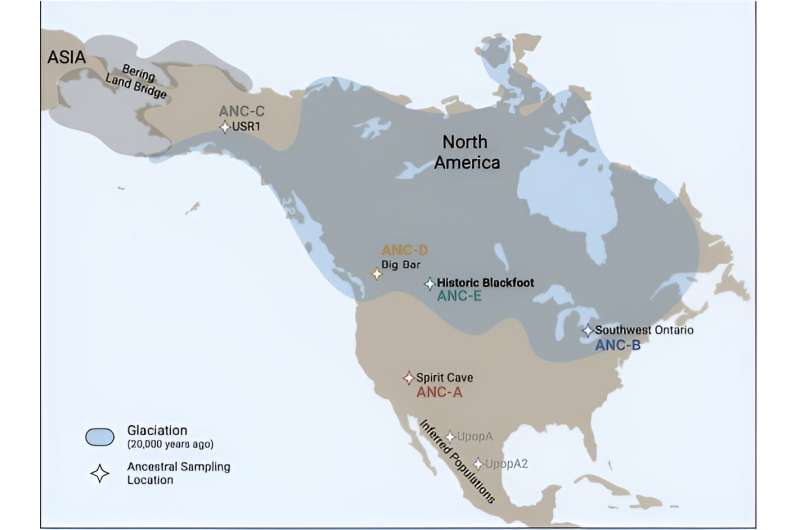Tracing the lineage of North America's native Blackfoot Confederacy

A team of researchers with varied backgrounds and affiliated with multiple organizations (including the Blackfoot Confederacy) in the U.S. and Canada has conducted a genetic study focused on tracing the lineage of North America's native Blackfoot Confederacy.
In their study, published in the journal Science Advances, the group collected tissue samples from several living members of the Blackfoot Confederacy, genetically sequenced them and then compared the data with the results from samples collected from the remains of Confederacy members exhumed from several ancient burial sites.
The Blackfoot Confederacy comprises linguistically related groups of Native Americans who make up the Blackfoot or Blackfeet people—they include the Siksika, the Kainai and two sections of the Peigan or Piikani—the Northern Piikani and the Southern Piikani. Historically, they were bison hunters and sometimes fishermen. They occupied large sections of the North American plains, in both Canada and the U.S.
By the late 19th century, most members had been consigned to reservations. More recently, tribe members have been suing the government and corporations to reclaim some of their original land. Part of that effort has involved proving that they have historical rights through their lineage. This new study supports such attempts.
In comparing the genetic evidence, the researchers found that modern Blackfoot people are descendants of a lineage that goes back approximately 18,000 years. They also found that the genetic data supports Blackfoot lore, passed down by word of mouth over generations, claiming that the Blackfoot people have been living in North America for at least 10,000 years.
The Blackfoot lineage has become a contentious issue over the past several years as members of the Blackfoot Confederacy contend that some of that land near the Rocky Mountains' eastern edges, now being tested for drilling by oil companies, is ancestral and therefore protected by treaties covering Blackfoot territory. The results of this effort bolster such claims.
The research team also found evidence that a major lineage split occurred among the people who migrated to North America approximately 18,000 years ago, giving rise to all present-day Indigenous people in North, Central and South America.
More information: Dorothy First Rider et al, Genomic analyses correspond with deep persistence of peoples of Blackfoot Confederacy from glacial times, Science Advances (2024). DOI: 10.1126/sciadv.adl6595
Journal information: Science Advances
2024 Science X NetworkChromosomal study suggests people were living in South America as far back as 18,000 years ago
No comments:
Post a Comment